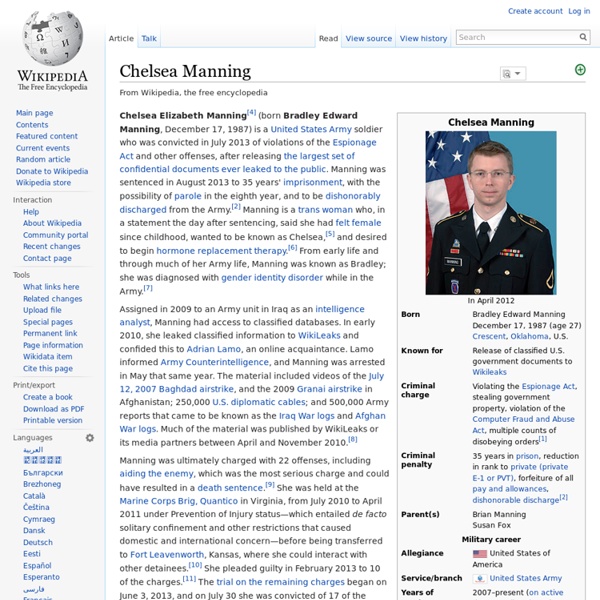Chelsea Manning, wikipedia

Manning 'Guilty' on Most Counts, Faces 100 Years in Prison
Manning supporters outside Fort Meade, Tuesday (Photo via Twitter / Ed Pilkington) Pfc. Bradley Manning, the army whistleblower who exposed egregious U.S. war crimes after revealing military documents to the website WikiLeaks, has been found guilty of almost all of his charges in a military court in Fort Meade, Maryland and could face a maximum of more than 100 years in jail. On Tuesday, Judge Col. Denise Lind found Manning not guilty of his most severe charge, "aiding the enemy," which supporters had feared because it held the potential for "life in prison." However, Manning's other charges, which include multiple charges under the Espionage Act, potentially hold the same sentence cumulatively. Manning's official sentencing phase begins Wednesday morning at 9:30 EST. Watch Democracy Now! Follow live tweets from journalist following the trial here: As reporter Kevin Gosztola points out , the verdict comes on the anniversary of the U.S.'
Transcript | US v Pfc. Manning, Article 39(a) Session, 11/08/12
For more information on the lack of public and press access to United States v. Pfc. Manning, visit the Center for Constitutional Rights, which filed a petition requesting the Army Court of Criminal Appeals (ACCA) "to order the Judge to grant the public and press access to the government's motion papers, the court's own orders, and transcripts of proceedings, none of which have been made public to date." This transcript of the Article 39(a) Session held on November 8, 2012 at Fort Meade, Maryland in US v Pfc. Judge: Army Col. Judge Lind Please be seated. Prosecution (Fein) [Appellate exhibit 379] ....after [yesterday's] session, defense and the Government [had a] discussion. [This next part concerns interrogatories from the defense to the prosecution concerning the Speedy Trial motion. ...because of all that an unanticipated number of questions from defense...prosecution has asked Court for motion to leave...26 November to 5 December to answer 137 questions. Defense (Coombs) Granted. No...
Cornel West and Chris Hedges discuss Bradley Manning verdict
Related:
Related:



